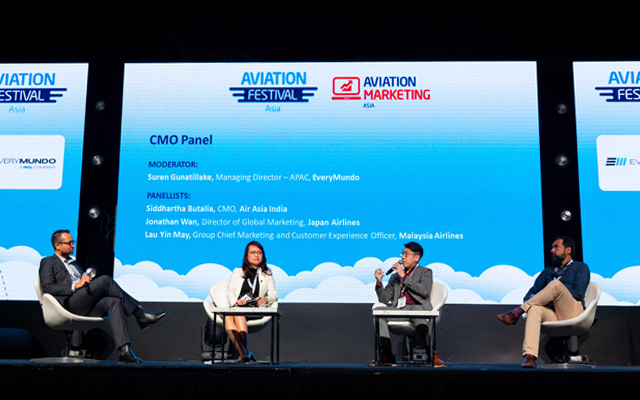- Greater personalisation needed for airlines to bring back the romance of air travel
- Data collection and understanding can present new business opportunities
- Access to customer data will come with greater quality of service expectations
Travel disruptions posed by the pandemic have present opportunities for airlines to demonstrate that they are more than just a mode of transport, and are also means to facilitate connections and link people with their families, friends and businesses, opined industry specialists on the CMO (chief marketing officer) Panel at the Aviation Festival Asia 2022 held last week in Singapore.
Marketers from AirAsia India, Malaysian Airlines and Japan Airlines also discussed a range of topics from digitisation, to building trust and leveraging new opportunities. Suren Gunatillake, managing director, APAC of EveryMundo, sat in as moderator.

The consensus was that despite disruptions to air travel, the industry has lived up to its reputation of being resilient. It has been able to adapt and even take a step back to understand where it is flying towards.
“I think what we have learnt is to be really agile… (to) innovate and do new things,” said Lau Yin May, group chief marketing and customer experience officer of Malaysian Airlines.
“That is how you continue to engage with the customers and get them so excited to continue that association with the brand.”
Personalisation is the way forward
Siddhartha Butalia, chief marketing officer of AirAsia India, was candid in his sentiments about how the industry has done a disservice to itself over the last 30 to 40 years: “We have commoditised travel into transportation.”
Undoing this would mean explicitly expressing how airlines add meaning into consumers’ lives. One way to do so, he opined, is through personalisation. For this, digitisation is an enabler, not just in the business process but in the mining of data – everything from travel duration, destination, and the types of trips.
“It’s really important to make sure that we’re collecting data and using it to add value to that customer,” noted Jonathan Wan, Japan Airlines’ director of global marketing.
Wan added that customers would “have certain expectations” of the airline now that it possesses their information. “There is this understanding that ‘hey, I’ve given this information freely, and I expect this personalisation’,” he elaborated.
Butalia agrees that consumers are now more conscious than ever of the data they are sharing and if they are doing it, brands must provide something in return.
Drawing upon an example of a recent loyalty campaign AirAsia India ran, Butalia said it invited consumers to “join the family” and conveyed the point that “being part of a family is supposed to be a rewarding experience”.
“What we’re also saying is that you can share a lot of personal information… because we are a brand that you can trust,” he said.

Wide ranging data application
Panellists reflected that data collection and understanding can bring multiple advantages to airlines and set them down paths to new business opportunities.
Data led Japan Airlines to focus on repatriation support for business travellers, and to strengthen its position as a carrier between Asia and the US.
In analysing data, Malaysian Airlines created 257 new products since the start of the pandemic. Of these, seven are still in use today, including the MHexplorer, a fully digitalised travel programme for students.
Lau reflected: “We know two things. One, our team is really good, they can do this stuff overnight. Two, we have a much better understanding of our consumers, what appeals to them, and how we can use this (experience) as a learning (point for) future product development.”
Understanding data obtained from organic searches during the pandemic also helped airlines to better respond to consumer needs.
“We were able to look at what people were searching for and make quick inclusions of these keywords,” said Wan.
For instance, in the early days of the pandemic, consumers were looking for things like “flexible ticketing” and “free changes”. Japan Airlines immediately saw to it that these key words were added to its web pages.
Over at AirAsia India, it was observed that traffic from online check-ins had tripled, informing the airline of changes to website usage and a growing preference for more direct engagement with the brand, shared Butalia.
Elaborating on the value of direct customer engagements, Wan said Japan Airlines partnered with Chinese online travel agents to create flagship stores in China that allow customers to purchase a ticket without friction.




















